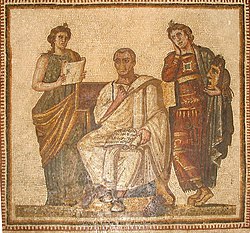
Back ثقافة إيطالية Arabic Cultura d'Itàlia Catalan Diwylliant yr Eidal Welsh Cultura de Italia Spanish فرهنگ در ایتالیا Persian Italian kulttuuri Finnish Culture de l'Italie French Olaszország kultúrája Hungarian Cultura italiana Italian イタリア文化 Japanese
This article may be too long to read and navigate comfortably. (October 2024) |
| Part of a series on the |
| Culture of Italy |
|---|
 |
| People |
| Traditions |





The culture of Italy encompasses the knowledge, beliefs, arts, laws, and customs of the Italian peninsula throughout history. Italy has been a pivotal center of civilisation, playing a crucial role in the development of Western culture. It was the birthplace of the Roman civilisation, the Catholic Church, and the Renaissance, and significantly contributed to global movements such as the Baroque, Neoclassicism, and Futurism.[1]
Italy is widely recognised as a cultural superpower and one of the primary birthplaces of Western civilisation.[2][3]
The essence of Italian culture is reflected in its art, music, cinema, style, and food. Italy gave birth to opera and has been instrumental in classical music, producing renowned composers such as Antonio Vivaldi, Gioachino Rossini, Giuseppe Verdi, and Giacomo Puccini. Its rich cultural heritage includes significant contributions to ballet, folk dances such as tarantella, and the improvisational theater of commedia dell'arte.[4]
The country boasts iconic cities that have shaped world culture. Rome, the ancient capital of the Roman civilisation and seat of the Catholic Church, stands alongside Florence, the heart of the Renaissance. Venice, with its unique canal system, and Milan, a global fashion capital, further exemplify Italy's cultural significance. Each city tells a story of artistic, historical, and innovative achievement.[5]
Italy has been the starting point of transformative global phenomena, including the Roman Republic, the Latin alphabet, civil law, the Age of Discovery, and the Scientific Revolution. It is home to the most UNESCO World Heritage Sites (60) and has produced numerous notable individuals who have made lasting contributions to human knowledge and creativity.
- ^ Cohen, I. Bernard (1965). "Reviewed work: The Scientific Renaissance, 1450-1630, Marie Boas". Isis. 56 (2): 240–42. doi:10.1086/349987. JSTOR 227945.
- ^ Marvin Perry, et al. (2012). Western Civilization: Since 1400. Cengage Learning. p. XXIX. ISBN 978-1-111-83169-1
- ^ Italy has been described as a "cultural superpower" by Arab News, the Washington Post, The Australian, and leaders including the former Foreign Affairs Minister Giulio Terzi di Sant'Agata and U.S. President Barack Obama.
- ^ Kimbell, David R. B. Italian Opera. Cambridge University Press, 1994.
- ^ Zirpolo, Lilian H. The A to Z of Renaissance Art. Scarecrow Press, 2009.
© MMXXIII Rich X Search. We shall prevail. All rights reserved. Rich X Search